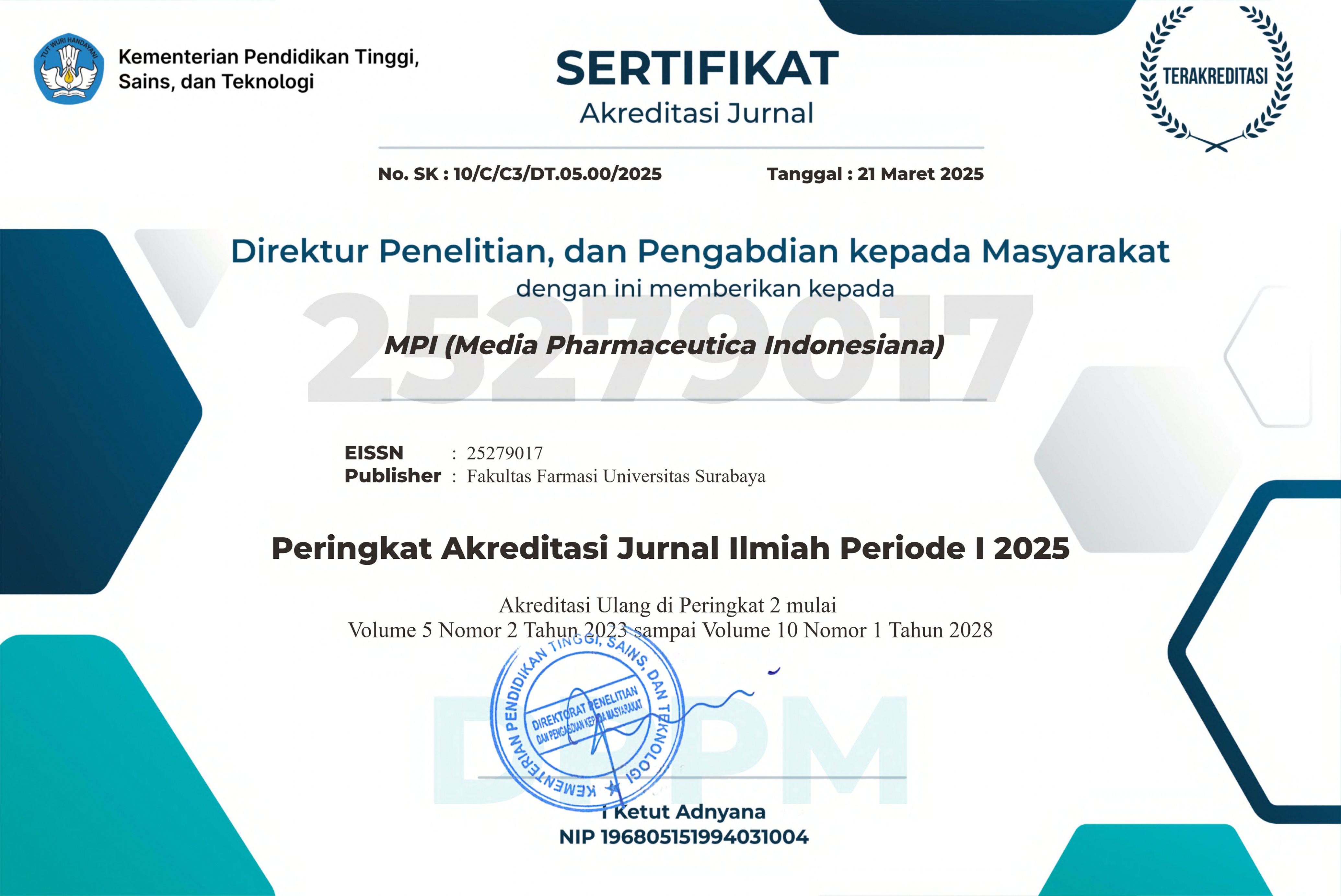Aktivitas Sitotoksik Ekstrak Biji Alpukat (Persea americana Mill.) pada Sel Kanker Payudara dan Serviks Secara In Silico dan In Vitro
 Abstract Views:
997 times
Abstract Views:
997 times
 PDF Downloads:
917 times
PDF Downloads:
917 times
Abstract
Kanker payudara dan servik merupakan kanker dengan jumlah terbanyak di Indonesia. Kemoterapi sebagai terapi kanker memiliki banyak efek samping, oleh karena itu diperlukan pengembangan obat antikanker terutama dari bahan alam yang efektif dan memiliki efek samping minimal. Salah satu bahan alam yang diprediksi mempunyai aktivitas antikanker adalah biji alpukat (Persea americana Mill.). Penelitian ini bertujuan untuk menentukan aktivitas sitotoksik ekstrak etanol biji alpukat pada sel kanker payudara dan serviks secara in silico dan in vitro. Senyawa aktif dalam biji alpukat di docking dengan reseptor estrogen (PDB code: 3ERT) and reseptor SIRT1 (PDB code: 4I5I) menggunakan program Molegro Virtual Docker 5.5 (MVD). Aktivitas sitotoksik secara in vitro dilakukan menggunakan metode Microculture Tetrazolium Technique (MTT) pada sel kanker payudara (MCF7), sel kanker serviks (HeLa) dan sel normal (Vero). Biji alpukat berisi 10 senyawa aktif yang diprediksi mempunyai aktivitas sitotoksik. Hasil uji in silico menunjukkan bahwa epicatechin gallate mempunyai nilai rerank score paling rendah yaitu -118,397 kkal/mol pada reseptor estrogen dan -133,694 kkal/mol pada reseptor SIRT1. Aktivitas sitotoksik secara in vitro ditunjukkan dengan nilai IC50 sebesar 537,37 μg/mL (MCF7), 383,21 μg/mL (HeLa) dan 541,67 μg/mL (Vero). Dari hasil uji in vitro menyatakan bahwa ekstrak etanol biji alpukat tidak memiliki aktivitas sitotoksik pada sel kanker MCF7 dan memiliki aktivitas sitotoksik lemah pada sel HeLa.
Breast and cervical cancer are cancers with the highest number in Indonesia. Chemotherapy, as one of the mainstay treatments of cancer, can cause harmful side effects; and, therefore, it is necessary to develop anticancer drug from natural ingredients with good efficacy and minimal side effects. One of the natural ingredients that is predicted to have anticancer activity is avocado seed (Persea americana Mill.). This study aimed to evaluate the in-vitro and in-silico cytotoxic activity of avocado seed extract on breast and cervical cancer cells. The active compounds in avocado seeds were docked with estrogen receptors (PDB code: 3ERT) and SIRT1 receptors (PDB code: 4I5I) using the MVD program. Cytotoxic activity in vitro was carried out using the MTT method on breast cancer cells (MCF7), cervical cancer cells (HeLa) and normal cells (Vero). Avocado seed contains 10 active compounds which are predicted to have cytotoxic activity. The findings from in-silico test showed that the “epicatechin gallate” had the lowest rerank score, i.e. -118.397 kcal/mol for the estrogen receptor and -133.694 kcal/ mol for the SIRT1 receptor. Cytotoxic activity in vitro was shown by IC50 values of 537.37 μg/mL (MCF7), 383.21 μg/mL (HeLa) and 541.67 μg/mL (Vero), respectively. The findings from in-vitro test showed that the avocado seed extract did not have cytotoxic activity on MCF7 cells and had weak cytotoxic activity on HeLa cells.
Downloads

This work is licensed under a Creative Commons Attribution-ShareAlike 4.0 International License.
Articles published in MPI are licensed under a Creative Commons Attribution-ShareAlike 4.0 International (CC BY-SA) license. You are free to copy, transform, or redistribute articles for any lawful purpose in any medium, provided you give appropriate credit to the original author(s) and MPI, link to the license, indicate if changes were made, and redistribute any derivative work under the same license.
Copyright on articles is retained by the respective author(s), without restrictions. A non-exclusive license is granted to MPI to publish the article and identify itself as its original publisher, along with the commercial right to include the article in a hardcopy issue for sale to libraries and individuals.
By publishing in MPI, authors grant any third party the right to use their article to the extent provided by the CC BY-SA license.

 DOI:
DOI:










